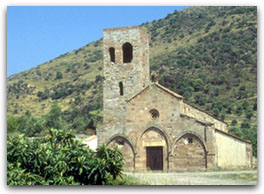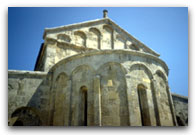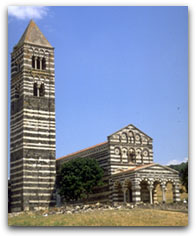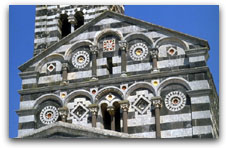Mystery surrounds other religious
buildings. The Cathedral of San Pietro near Bosa, which dates from 1072, is said to have been
built on the site of the mythical Calmedia, a lost city that has never been found. The same is
true of the Cathedral of San Pietro di Sorres, one of the most beautiful monuments of Christian
art, which was built of volcanic material taken from a nearby area by the inhabitants of another
lost city, Sorra. We do not know who the architect of this magnificent
Cathedral was.
|
|

 S. Pietro Extramuros near Bosa S. Pietro Extramuros near Bosa |

 S. Gavino in Porto Torres S. Gavino in Porto Torres |
|
Two other testaments to faith are
the big basilicas dedicated to Sardinian martyrs; the basilica of San Simplicio in Olbia and the
basilica of San Gavino in Porto Torres, which are well worth visiting. Only two churches have
3 main doors, the purple tinted trackytic cathedral of San Pantaleo in Dolianova, and the
Duomo in Cagliari.
|
Any tour of these historical
churches, would be incomplete without a visit to perhaps the most beautiful building among
Sardinian mediaeval churches; the Basilica della SS. Trinità di Saccargia, in the province of
Sassari. Built of alternate rows of horizontal white limestone and black basalt, this basilica is
the earliest Sardinian monument in the style of the big Tuscan churches, in particular, in the
style of the churches in Pisa. The judge Costantino I and his wife Marcusa, a very religious
and popular woman, decided to build this beautiful basilica. According to legend, this decision
was taken after they had received a grace (favour) from God. This basilica was solemnly
consecrated in 1116. 11 years later the judge Costantino I died and was buried in the
basilica. Marcusa was devastated and decided to leave for Sicily, where she founded a
hospital. Then she pined slowly away, passing her last days in prayer and remembering her
husband.
|
|

 S.S. Trinità of Saccargia S.S. Trinità of Saccargia |

 S.S. Trinità of
Saccargia S.S. Trinità of
Saccargia |
|
After many centuries, the basilica
of Saccargia is still an important reference point for the faithful of Sardinia, who still go to this
church to be released from a vow, to beg for grace or simply to prey. As in the past this
basilica impresses everybody with its elegant lines of white limestone and black basalt, a
voiceless testimony to a great story of faith and religiousness.
|
|